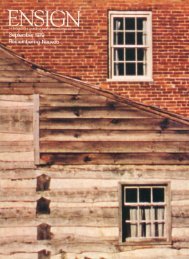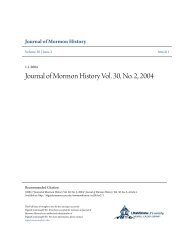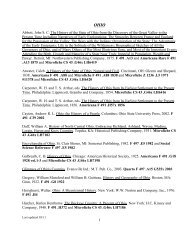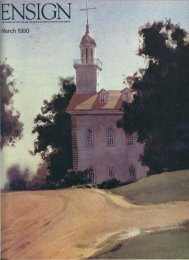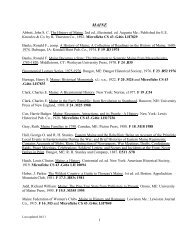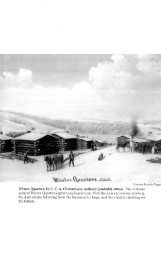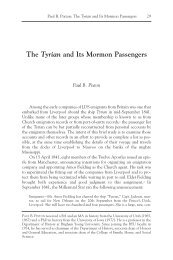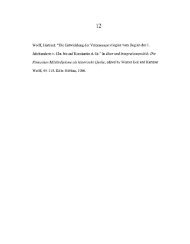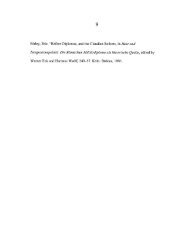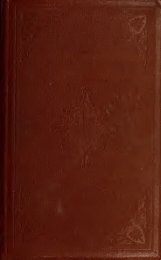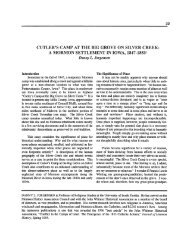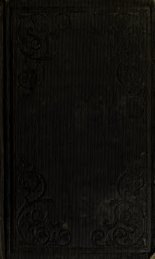Life On Board a Mormon Emigrant Ship - Brigham Young University
Life On Board a Mormon Emigrant Ship - Brigham Young University
Life On Board a Mormon Emigrant Ship - Brigham Young University
Create successful ePaper yourself
Turn your PDF publications into a flip-book with our unique Google optimized e-Paper software.
418/Pratt and Smart<br />
daily and the following rations weekly:<br />
tlNO and one-half pounds of breadstuff,<br />
one ponnd of wheaten flour, five ponnds<br />
of oatmeal, tlNO pounds of rice (five<br />
ponnds of potatoes could be substituted<br />
for one pound of oatmeal or rice), two<br />
onnces of tea , half a ponnd of sugar ,<br />
half a pound of molasses, and one gill of<br />
vinegar. Split peas, corned beef, and<br />
pork were added to this protein-deficient<br />
diet , 5 along with nrustard and pepper, in<br />
1855.<br />
American ships were reputedly the lNOrst<br />
for shortchanging on the standard provisions.<br />
An Irish philanthropist, Vere<br />
Foster, sailed for lmerica on the Waslr<br />
ington in the fall of 1850 to determine<br />
what typical conditions were like in<br />
steerage for the emigrants he had assisted.<br />
Provisions were not issued at<br />
all for the first five or six days. Having<br />
brought a scale with him, Foster was<br />
able to demonstrate that for the entire<br />
voyage the passengers did not receive<br />
even half of the rations to which they<br />
were entitled. Flour 6 was the only item<br />
issued nearly in full.<br />
The act of 1842 required that passengers<br />
have contract tickets. Some of the<br />
tickets, such as the one in figure 2,<br />
contained a warning for passengers to<br />
take extra provisions. Those who could<br />
afford to, secured extra provisions while<br />
they waited to sail. <strong>On</strong>e journal mentioned<br />
the following extras: good flour,<br />
potatoes, salt preserves, a good cheese<br />
and a cooked ham, eggs, lemons, preserved<br />
fish, plumbs ink, coffee currant, spices,<br />
port wine, pepper, ginger, cayenne<br />
pepper, sweet biscuits, baking powder,<br />
lard, cream of t,rtar, and pickled<br />
cabbage. The naivl.! emigrant, however,<br />
would not bring extra food or food of the<br />
right kind. Ie had to pay dearly for<br />
some of the ship's private prov1s1ons<br />
once he was at sea if he wanted a more<br />
varied menu or if the journey took longer<br />
than planned. Under such trying conditions,<br />
a new mother might lose her milk,<br />
and adequate food for infants was usually<br />
nnavailable.<br />
Besides extra foodstuffs, the passengers<br />
were expected to bring a strawfilled mattress,<br />
bedding, cooking utensils, and<br />
provision boxes. Utensils usually included<br />
cutlery, a tin plate, drinking<br />
can, tin quart pot, and the ubiquitous<br />
chamber pot. Some also brought soap,<br />
candles, towels, rolling pin boards, carpet<br />
slippers, shoe brushes, and, last but<br />
not least, consecrated oil. The extra<br />
food and articles might add another ponnd<br />
to the passage fare. Before 1846 sane of<br />
the Saints brought contributions from<br />
their branches of the Church for the<br />
building of the Nauvoo Temple.<br />
Before the ships lNOuld sail, the local<br />
Church leaders lNOuld organize the emigrants.<br />
Not much is known about the<br />
organization of the first group of MOrmon<br />
emigrants, but the second ship to sail<br />
for America, the North America, had a<br />
presiding elder and six counselors, cho-sen<br />
personally by <strong>Brigham</strong> Yonng. <strong>On</strong> 6<br />
February 1841, the day before the Sheffield<br />
sailed, a conncil meeting was held<br />
in Liverpool, to which the ship's captain<br />
was invited. Three MOrmon Apostles organized<br />
the emigrants, with a president as<br />
leader, six counselors, and a clerkhistorian.<br />
By 1848-49, a pattern of<br />
organization had emerged. The presiding<br />
Church authority in England "WOuld choose<br />
the emigrant leader, called the ship's<br />
president, present him with a letter of<br />
authority, and then leave him to organize<br />
the rest of the group during the first<br />
few days at sea.<br />
As the emigrants boarded the ship, the<br />
British Mission president or his agents<br />
would assign them berths • Samuel W.<br />
Richards, president from May 1852 to July<br />
1854, was lmown to lNOrk fran daybr'flk to<br />
2:00 a.m. preparing a ship to sail. All<br />
his "WOrk paid dividends. In 1854 a select<br />
committee of the House of Commons on<br />
emigrant ships concluded "that no ships<br />
under the provisions of the 'Passengers<br />
Act' could be depended upon for comfort<br />
and security in the same degree as those<br />
nnder his administration. The MOrmon<br />
ship is a Family under strong and accepted<br />
discipline, with every provision<br />
3



